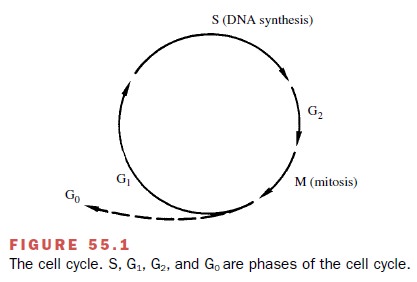Chapter: Modern Pharmacology with Clinical Applications: The Rational Basis for Cancer Chemotherapy
Concepts in Tumor Cell Biology
CONCEPTS IN
TUMOR CELL BIOLOGY
The Normal Cell Cycle
The normal cell cycle consists of a definable sequence of events that
characterize the growth and division of cells and can be observed by
morphological and biochemical means. The cell cycle is depicted in Fig. 55.1.
Two of the four phases of the cell cycle can be studied directly: the M-phase, or mitosis, is easily visible
using light mi-croscopy because of chromosomal condensation, spin-dle
formation, and cell division. The S-phase
is the pe-riod of DNA synthesis and is observed by measuring the incorporation
of tritiated thymidine into cell nuclei.

The mitotic index is the fraction or percentage of cells in mitosis
within a given cell population. The thymidine
labeling index is the fraction of cells incorpo-rating radioactive
thymidine. They represent cells in M-phase and S-phase and define the
proliferative charac-teristics of normal and tumor cells.
The Tumor Cell Cycle
The duration of the S-phase
in human tumors is 10 to 20 hours. This period is followed by the G2-phase, or period of
preparation for mitosis, in which cells contain a tetraploid number of
chromosomes. The G2-phase lasts only 1 to 3 hours for most cell
types, with mitosis itself lasting approximately 1 hour. The two daughter cells
then enter the G1-phase,
whose duration varies from several hours to days. The G1-phase also
can give rise to a resting state, termed G0, in which cells are
relatively inactive metabolically and are resistant to most chemotherapeutic
drugs.
The generation time, or Tc,
is the time required to complete one cycle of cell growth and division. The Tc
will vary with the duration of the G1-phase. The factors that
influence daughter cells to enter the G0, or resting stage, are not
well understood. The ability to cause such resting cells to reenter the cell
cycle would be quite use-ful, since proliferating
cells generally are more sensitive to
chemotherapy than are resting cells.
Related Topics